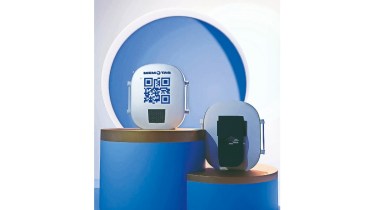Dementia is on the rise in India, affecting 8.8 million people—over 7% of the elderly population. With specialist shortages causing diagnostic delays of six months or more, families face an overwhelming caregiving burden. Over three million caregivers leave the workforce annually in India alone, underscoring the urgent need for accessible, effective eldercare solutions.
This is where MemoTag comes in as an AI-powered wearable that actively monitors both physical and cognitive health. By analysing speech patterns, mobility, and behaviour in real time, it flags early signs of cognitive decline, equipping caregivers and eldercare facilities with timely, actionable insights. A creation of two young entrepreneurs—Reyansh Juneja and Japnoor Sandhu—MemoTag costs `15,000 per year, which includes both the wearable device and AI-driven health monitoring. “Compared to the cost of hiring specialised caregivers or managing late-stage complications, it’s a fraction of the expense,” Juneja told FE.
MemoTag, which uses a SaaS revenue model, is already witnessing impressive traction: 2,200 pre orders worth `3.3 crore from eldercare agencies, partnerships with eight eldercare brands, and a strategic alliance with SMS Group, which has offered them access to their 35,000-hospital network.
According to Juneja, dementia isn’t just about memory loss—it’s an unforgiving disease that slowly erases a person’s identity. Families are left not just emotionally shattered but also overwhelmed by the daily reality of caregiving. The two co-founders experienced this firsthand with their own grandparents. “At first, we came up with a quick fix using an Amazon tracking device —just to make sure our grandparents weren’t wandering off. But it quickly became clear that location tracking wasn’t enough. What about their speech patterns? Their behaviour? Their cognitive responses? What if we could predict early signs of decline before they turned into a full-blown crisis?” he reasoned.
That’s how MemoTag was born – not as a company idea, but as a deeply personal attempt to solve a problem the duo were struggling within their own homes. Juneja feels that in India, dementia is often dismissed as just “old age forgetfulness” rather than recognised as a serious neurodegenerative disease.
Smartwatches and fitness trackers monitor physical health, but they aren’t built for dementia care. MemoTag goes deeper, analysing speech patterns, behaviour, and cognitive responses to provide insights that truly matter to caregivers.
Juneja emphasises that MemoTag is not just another wearable — it’s an AI-powered health companion that continuously learns from the user’s behaviour and provides caregivers with real-time insights. For instance, it detects subtle changes in speech that may indicate cognitive decline. The wearable monitors movement patterns, detecting signs of wandering, restlessness, or inactivity. It tracks how engaged a person is throughout the day, flagging signs of isolation or withdrawal. Moreover, it sends instant notifications if something seems off, so caregivers can act immediately.
Over time, MemoTag doesn’t just track—it predicts. The AI continuously improves as it gathers more data, helping families intervene early rather than reacting too late. “We’re partnering with eldercare facilities to integrate MemoTag into caregiving institutions where it can make an immediate impact. At the same time, we’re focused on educating families why early detection matters,” Juneja said.
“While our immediate focus is launching MemoTag in India, our long-term vision is global. Dementia is a growing crisis worldwide, with countries like the US and UK seeing a sharp rise in cases. These markets not only have greater awareness but also higher purchasing power, making them ideal for expansion,” he summarised.
QUOTE
Reyansh Juneja, founder, MemoTag
In India, dementia is often dismissed as just old age forgetfulness rather than recognised as a serious neurodegenerative disease
MENTAL HEALTH
n Dementia affects 8.8 million people in India, representing
7.4% of adults aged 60 and older
n MemoTag is a cognitive health tracking and data analysis tool for dementia & elder caregiving
n The wearable monitors movement patterns, detecting signs of wandering & restlessness
n It analyses speech patterns, mobility & behaviour and flags early signs of cognitive decline
n MemoTag is priced at `15,000 per year for both the wearable and its AI platform
